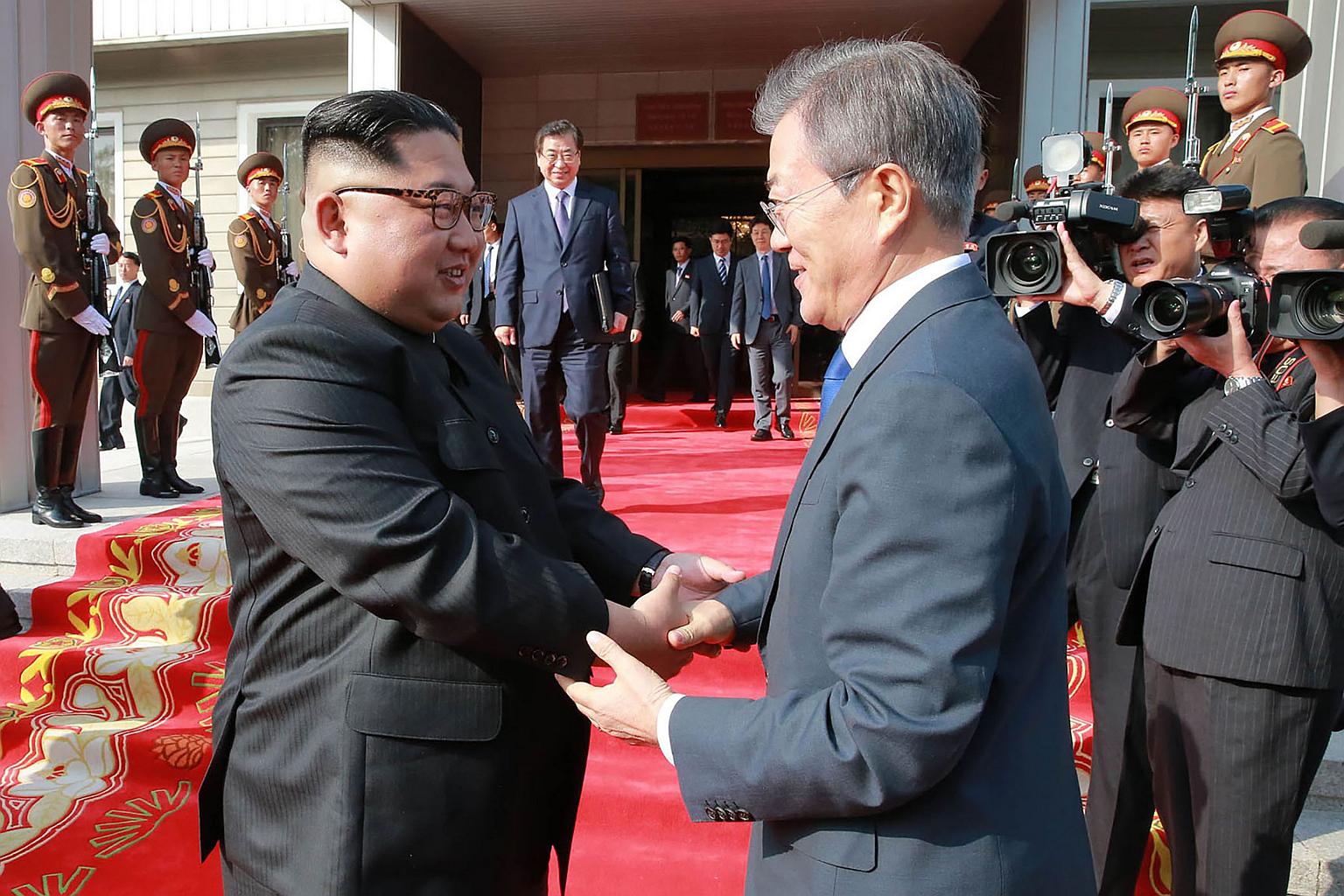Moon Jae-in's bid to declare end to Korean War this year doable, but stumbling blocks remain: Experts
Sign up now: Get insights on Asia's fast-moving developments

South Korea's President Moon Jae-in (right) shaking hands with North Korea's leader Kim Jong Un after their second summit at the north side of the truce village of Panmunjom, at the Demilitarized Zone.
PHOTO: AFP
SEOUL (KOREA HERALD/ASIA NEWS NETWORK) - Experts say declaring a formal end to the 1950-53 Korean War this year is not impossible, but the North's denuclearisation and China's involvement are potential stumbling blocks.
They were reacting to South Korean President Moon Jae-in's comments in an interview with The Straits Times before his three-day state visit to Singapore this week.
Mr Moon said his administration aims to declare an end to the Korean War this year, which marks the 65th anniversary of the signing of an armistice.
"As agreed in the Panmunjeom Declaration, my government's goal is to declare an end to the war this year, the 65th anniversary of the signing of the armistice," Mr Moon said.
"As for the timing and format (of the official declaration), we will closely consult with North Korea and the US and others. There have been additional discussions for that matter."
In the joint statement signed by Moon and North Korean leader Kim Jong-un at the April 27 inter-Korean summit, the leaders agreed to work for the complete denuclearisation of the Korean Peninsula and formally end the Korean War this year.
"There is a consensus to some extent that South Korea, North Korea and the US will declare an end to the Korean War, and we continue to take interest and make efforts," said Cheong Wa Dae spokesman Kim Eui-kyeom during a briefing on Thursday (July 12).
Experts say declaring an end to the Korean War this year is not impossible, with South Korea's role in persuading both North Korea and the US more important than ever.
"I think the US will make a decision in July, hold consultations in August and declare an end to the Korean War in September," said Mr Hong Min, a senior researcher at the Korea Institute for National Unification.
"It would be important to do so by the end of September, because that's when both Trump and Kim have to show some political achievements to appeal to a domestic audience," he said, pointing to Oct 10, the founding day of North Korea's ruling Workers' Party, and November, when the US will hold mid-term elections.
As for possible venues, Mr Hong identified New York, where the UN General Assembly is held in September, and third countries like Switzerland.
Bringing a formal end to the Korean War, which ended in an armistice, not in a peace treaty, is seen as the first step South Korea and the US could take to guarantee the North Korean regime's security as they continue to push forward in negotiations for North Korea's denuclearisation.
Before the historic summit between US President Donald Trump and Mr Kim on June 12 in Singapore, expectations were high for a possible three-way summit involving Mr Moon, Mr Kim and Mr Trump to declare an end to the Korean War.
Mr Trump himself said he hopes the war "will soon end," following the summit.
Still, there are obstacles that could complicate the prospect.
In a sign of a possible shift in Washington's stance, however, US Secretary of State Mike Pompeo balked at a proposal to discuss the declaration of an end to the Korean War by North Korean officials during his visit to Pyongyang last week, according to the North's state-run media.
The US might have realised that declaring an end to the Korea War, which experts say is a political statement that is not legally binding and technically not difficult, is one of few remaining bargaining chips in negotiations with the North.
"The US would have to consider that declaring an end to the war could open a debate over a need to reduce arms on the Korean Peninsula and withdraw the US troops from South Korea," said Kim Hyun-wook, a professor at the Korea National Diplomatic Academy.
As North Korea and the US appear to remain at odds over what should come first and be prioritised in the denuclearisation process, how quickly they reach an agreement on the sequence is crucial.
"First, there should be a progress in denuclearisation talks between North Korea and the US. The US will at least require North Korea to declare its nuclear weapons programmes," said Shin Beom-chul, senior researcher at the Asan Institute for Policy Studies.
"If there is such a progress, I think it is possible for a three-way meeting or a four-way meeting involving China to be held at the UN General Assembly in September," he said.
"The South Korean government's role is important to persuade North Korea to accelerate its denuclearisation process and the US to be more supportive of declaring an end to the war."
China, which has hinted at its willingness to engage in the process of ending the war and stressed its role in matters on the Korean Peninsula, could also pose a challenge, Shin pointed out.
"If China is involved, it will delay the process of declaring an end to the war. But if it wants to be involved but is excluded, China will try to delay the process by wielding influence over North Korea," he said.
In the Panmunjeom Declaration, Moon and Kim agreed to seek to hold three-way talks among the two Koreas and the US, or four-way talks involving China to pursue the declaration of the end of the war. The US, which backed South Korea in the Korean War, and China, which backed the North, are both signatories to the armistice.
The South Korean government has maintained that China could be left out of the process in declaring an end to the Korean War, but said its role is essential in signing a peace treaty.


